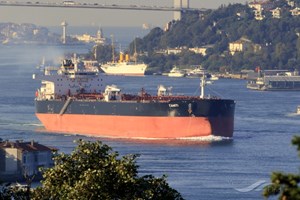Crude tanker hauling Russian oil sits for days off UAE's coast
(Bloomberg) – An oil tanker hauling a cargo of Russian crude has been sitting off the coast of the United Arab Emirates for three days, raising the prospect that the gulf state might become customer for Moscow.
Having moored at a jetty serving the country’s biggest refinery, the Tahiti, a Suezmax-class ship able to transport 1 million barrels of oil, has been anchored a short distance from a terminal at the UAE port of Ruwais. It left Murmansk, a port in Russia’s part of the Arctic Sea, in early October.
Russia urgently needs to find new customers for its crude because, from Dec. 5, almost all seaborne deliveries into Europe will be banned. The 27-nation EU is prohibiting imports to punish Russia for its war in Ukraine.
Tahiti arrived at a jetty serving ADNOC’s refinery in Abu Dhabi on Wednesday night, spending about 36 hours moored there before leaving again. Ruwais is inside the Persian Gulf, making it unlikely the vessel went there to refuel.
The signals from the vessel don’t suggest it unloaded, but the ship’s draft is entered manually and may simply not have been updated. An ADNOC spokesman declined to comment.
The vessel had previously been signaling its destination as Jamnagar in India, according to ship tracking data monitored by Bloomberg.
The ship’s draft indicates that it only had a part cargo on board. Based on where it loaded, it is likely have carried either Lukoil’s Varandey crude or Gazprom Neft’s Novy Port grade, both of which are exported from Murmansk.
Varandey has an API gravity of about 25.5 degrees and a sulfur content of 0.23%. Novy Port is both less dense than Varandey, at 35 degrees, and sweeter, with a sulfur content of 0.1%.
Russia has been struggling to find new markets for its crude shunned by European buyers since its troops invaded Ukraine in February.
Moscow will need to find outlets for about 1.5 million barrels a day more crude when the EU’s sanctions begin.
Importing and processing Russian crude at Ruwais, if it happened, could free up domestic crude for export and could prove profitable if purchases are made at deep discounts.



